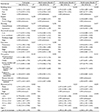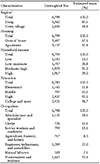1. Ge P, Dong C, Ren X, Weiderpass E, Zhang C, Fan H, et al. The high prevalence of low HDL-cholesterol levels and dyslipidemia in rural populations in Northwestern China. PLoS One. 2015; 10(12):e0144104.

2. Rosenson RS, Brewer HB, Rader DJ. Lipoproteins as biomarkers and therapeutic targets in the setting of acute coronary syndrome. Circ Res. 2014; 114(12):1880–1889.

3. Heinecke JW. The HDL proteome: a marker--and perhaps mediator--of coronary artery disease. J Lipid Res. 2009; 50:S167–S171.

4. Redondo S, Martínez-González J, Urraca C, Tejerina T. Emerging therapeutic strategies to enhance HDL function. Lipids Health Dis. 2011; 10:175.

5. Makariou S, Liberopoulos E, Florentin M, Lagos K, Gazi I, Challa A, et al. The relationship of vitamin D with non-traditional risk factors for cardiovascular disease in subjects with metabolic syndrome. Arch Med Sci. 2012; 8(3):437–443.

6. Rosenson RS. Low HDL-C: a secondary target of dyslipidemia therapy. Am J Med. 2005; 118(10):1067–1077.

7. Auwerx J, Bouillon R, Kesteloot H. Relation between 25-hydroxyvitamin D3, apolipoprotein A-I, and high density lipoprotein cholesterol. Arterioscler Thromb. 1992; 12(6):671–674.

8. Vimaleswaran KS, Cavadino A, Hyppönen E. APOA5 genotype influences the association between 25-hydroxyvitamin D and high density lipoprotein cholesterol. Atherosclerosis. 2013; 228(1):188–192.

9. Schnatz PF, Nudy M, O'Sullivan DM, Jiang X, Cline JM, Kaplan JR, et al. Coronary artery vitamin D receptor expression and plasma concentrations of 25-hydroxyvitamin D: their association with atherosclerosis. Menopause. 2012; 19(9):967–973.
10. Gordon DJ, Probstfield JL, Garrison RJ, Neaton JD, Castelli WP, Knoke JD, et al. High-density lipoprotein cholesterol and cardiovascular disease. Four prospective American studies. Circulation. 1989; 79(1):8–15.

11. Escolà-Gil JC, Julve J, Griffin BA, Freeman D, Blanco-Vaca F. HDL and lifestyle interventions. Handb Exp Pharmacol. 2015; 224:569–592.

12. Tosheska Trajkovska K, Topuzovska S. High-density lipoprotein metabolism and reverse cholesterol transport: strategies for raising HDL cholesterol. Anatol J Cardiol. 2017; 18(2):149–154.

13. Kontush A, Lindahl M, Lhomme M, Calabresi L, Chapman MJ, Davidson WS. Structure of HDL: particle subclasses and molecular components. Handb Exp Pharmacol. 2015; 224:3–51.

14. Freeman DJ, Caslake MJ, Griffin BA, Hinnie J, Tan CE, Watson TD, et al. The effect of smoking on post-heparin lipoprotein and hepatic lipase, cholesteryl ester transfer protein and lecithin: cholesterol acyl transferase activities in human plasma. Eur J Clin Invest. 1998; 28(7):584–591.
15. Ministry of Health and Welfare, Korea Centers for Disease Control and Prevention. Korea Health Statistics 2010: Korea National Health and Nutrition Examination Survey (KNHANES V-1) [Internet]. Cheongwon: Korea Centers for Disease Control and Prevention;2011. Accessed Apr 10, 2017. Available from:
https://knhanes.cdc.go.kr/knhanes/sub03/sub03_02_02.do.
16. Ministry of Health and Welfare, Korea Centers for Disease Control and Prevention. Korea Health Statistics 2011: Korea National Health and Nutrition Examination Survey (KNHANES V-2) [Internet]. Cheongwon: Korea Centers for Disease Control and Prevention;2012. Accessed Apr 10, 2017. Available from:
https://knhanes.cdc.go.kr/knhanes/sub03/sub03_02_02.do.
17. Ministry of Health and Welfare, Korea Centers for Disease Control and Prevention. Korea Health Statistics 2012: Korea National Health and Nutrition Examination Survey (KNHANES V-3) [Internet]. Cheongwon: Korea Centers for Disease Control and Prevention;2013. Accessed Apr 10, 2017. Available from:
https://knhanes.cdc.go.kr/knhanes/sub03/sub03_02_02.do.
18. Kweon S, Kim Y, Jang MJ, Kim Y, Kim K, Choi S, et al. Data resource profile: the Korea National Health and Nutrition Examination Survey (KNHANES). Int J Epidemiol. 2014; 43:69–77.

19. Ni WQ, Liu XL, Zhuo ZP, Yuan XL, Song JP, Chi HS, et al. Serum lipids and associated factors of dyslipidemia in the adult population in Shenzhen. Lipids Health Dis. 2015; 14:71.

20. Cugnetto ML, Saab PG, Llabre MM, Goldberg R, McCalla JR, Schneiderman N. Lifestyle factors, body mass index, and lipid profile in adolescents. J Pediatr Psychol. 2008; 33(7):761–771.

21. Alberti KG, Eckel RH, Grundy SM, Zimmet PZ, Cleeman JI, Donato KA, et al. Harmonizing the metabolic syndrome: a joint interim statement of the International Diabetes Federation Task Force on Epidemiology and Prevention; National Heart, Lung, and Blood Institute; American Heart Association; World Heart Federation; International Atherosclerosis Society; and International Association for the Study of Obesity. Circulation. 2009; 120(16):1640–1645.
22. Yun YM, Song J, Ji M, Kim JH, Kim Y, Park T, et al. Calibration of high-density lipoprotein cholesterol values from the Korea National Health and Nutrition Examination survey data, 2008 to 2015. Ann Lab Med. 2017; 37(1):1–8.

23. Forey BA, Fry JS, Lee PN, Thornton AJ, Coombs KJ. The effect of quitting smoking on HDL-cholesterol - a review based on within-subject changes. Biomark Res. 2013; 1(1):26.

24. Muratsubaki T, Hattori T, Li J, Fukudo S, Munakata M. Relationship between job stress and hypo-high-density lipoproteinemia of Chinese workers in Shanghai: the Rosai Karoshi Study. Chin Med J (Engl). 2016; 129(20):2409–2415.
25. Wang H, Peng DQ. New insights into the mechanism of low high-density lipoprotein cholesterol in obesity. Lipids Health Dis. 2011; 10:176.

26. Zhao X, Zhang HW, Zhang Y, Li S, Xu RX, Sun J, et al. Impact of smoking status on lipoprotein subfractions: data from an untreated Chinese cohort. Biomed Environ Sci. 2017; 30(4):235–243.
27. Song W, Wang W, Dou LY, Wang Y, Xu Y, Chen LF, et al. The implication of cigarette smoking and cessation on macrophage cholesterol efflux in coronary artery disease patients. J Lipid Res. 2015; 56(3):682–691.







 PDF
PDF ePub
ePub Citation
Citation Print
Print





 XML Download
XML Download